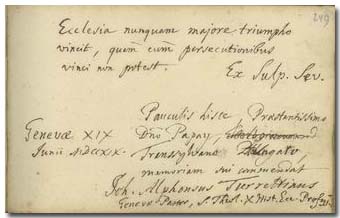
Ecclesia nunquam majore triumpho vincit, quam cum persecutionibus
vinci non potest.
Ex Sulp[icio] Sev[ero] *
Pauculis hisce, Praestantissimo D[omi]no Papay,
[Ecclesiarum *] Transsylvano
[Delegato *]
Hungaro, memoriam sui commendat
Joh[annes] Alphonsus Turrettinus
Genevae Pastor, S[acrae] Theol[ogiae] & Hist[oriae]
Ecc[lesiasticae] Professor
Genevae XIX Junii MDCCXIX.
|
* Paraphrase of Sulpice Severe, Chronici 2.32 (PL
20.147): “neque majore umquam triumpho vicimus,
quam cum decem annorum stragibus vinci non potuimus.” *
The word “Ecclesiarum” is deleted, while the “Delegato” is
corrected in “Hungaro”.
|
|
|
The Church never won a major victory than when she was not won by
persecutions.
From Sulpice Severe *
With this trifle I recommend myself into the
illustrious Transylvanian Hungarian Mr. Pápay
Jean Alphonse Turrettini
pastor of Geneva,
professor of theology and church history
In Geneva, on June 19, 1719.
|
p. 249. Geneva, June 19, 1719
Turrettini, Jean Alphonse
(1671-1737), Swiss Reformed
theologian
Jean Alphonse Turrettini was born in Geneva on August 13, 1671,
the son of the Reformed pastor François T. (1623-1687), and
grandson of the theologian Bénédict T.
(1588-1631). The ancestors of his old Patrician family had run
silk manufactures and banks in Lucca, from where they moved out of
religious conviction first to Lyon, then to Antwerp, to Zürich,
and finally in 1592 to Geneva. Jean Alphonse studied at the
academy of Geneva, and familiarized himself with Cartesian
philosophy and with moderate rational theology. In 1691 he
finished his studies and until 1693 he travelled in the
Netherlands, England and France, where he made acquaintance with a
large number of scholars. In London he fell ill, and this illness
accompanied him until his death. In 1694 he became a pastor, and
began his office in the Italian church of Geneva. He had a perfect
command of English and Italian, both orally and in writing. He
renewed the liturgy of service, introduced confirmation, and
completed a translation of the New Testament. In 1697 he became
professor of the recently founded chair of church history, and in
1705 professor of theology at the academy of Geneva. He wanted to
relieve students from obligatorily signing the so-called "formula
consensus", a declaration of agreement at their admission. He
lectured on selected themes of theology and moral theology, in
order to avoid the problems of systematic theology regarded by him
as superfluous. In 1728 his students published in the Netherlands
their notes recorded at his lectures, but he never acknowledged it
for his own. He was a representative of patient, eirenicist
theology. He did a lot at an European level for conciliating the
Reformed and Lutheran branches of Protestantism, cooperating,
among others, with the Archbishop of Canterbury William Wake. For
these efforts he was awarded a golden medal by the King of
Prussia. Later he was admitted in the Scientific Society of
Berlin. He was a member of the Society for the Propagation of the
Gospel. Encouraged by his friends, in 1737 he completed his great
work on natural theology. His health quickly worsened, and died on
May 1, 1737. His main works: Pyrrhonismus pontificius
(disputatio in Holland, 1692). – Brevis et pacifica de
articulis fundamentalibus diquisitio, qua ad protestantium
concordiam mutuamque tolerantiam via sternitur, praes. Joh.
Alph. Turretinus … resp. Jacobus Serces … Geneva, 1719. – De
sacrae scripturae interpretandae modo, 1728. – Historiae
ecclesiasticae compendium a Christo nato usque ad annum 1700.
Geneva, 1734. – Orationes academicae … Geneva, 1737. –
Cogitationes et dissertationes theologicae … Geneva, 1737. 2
tom. – Theologia naturalis. – Opera omnia theologica,
philosophica et philologica. Leeuwarden, 1774-1776. 3 vols.
This quotation from Sulpice Severe was probably
intended by Turrettini as an allusion to the tribulations of the
Reformed church in Transylvania. First he wrote his dedication
like "… Papay, Ecclesiarum Transsylvaniae [?] Delegato",
but then he corrected as "… Papay, Transsylvano Hungaro".
Benedict Pictet (p. 213) corrected his
dedication written on the same day in the same vein.
– The above mentioned Archbishop William Wake wrote in the album
in January of 1719 (p. 469).
•
HBLS • Jöcher • Michaud • SchwL |

